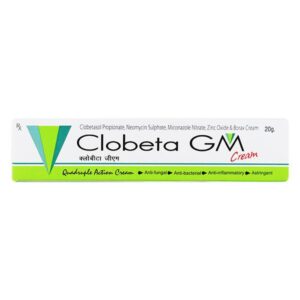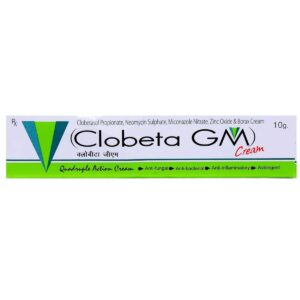ZINC OXIDE + CLOBETASOL + BORAX + NEOMYCIN SULPHATE + MICONAZOLE NITRATE
Zinc Oxide: Zinc oxide is a medication commonly used as a topical skin protectant and treatment for various skin conditions. It is available in the form of ointment, cream, powder, or lotion and is used to treat minor cuts, burns, diaper rash, and other irritations.
The mechanism of action of zinc oxide is not fully understood. However, it is believed to work by forming a protective barrier on the skin to prevent further damage or irritation. It also has mild antiseptic properties and can help soothe inflammation.
The dose of zinc oxide depends on the specific formulation and the condition being treated. It is usually applied directly to the affected area of the skin as directed by a healthcare professional. It is important to follow the instructions provided on the product packaging or as advised by a healthcare provider.
Zinc oxide is generally considered safe and well-tolerated when used topically. However, some individuals may experience mild side effects such as skin irritation, redness, or itching. These side effects are usually temporary and should subside with continued use. If any severe side effects or allergic reactions occur, such as hives, difficulty breathing, or swelling of the face, lips, or throat, immediate medical attention should be sought.
It is important to note that while zinc oxide is generally safe for topical use, it should not be ingested or applied to open wounds without medical supervision. Additionally, if symptoms persist or worsen after using zinc oxide, it is advisable to consult a healthcare professional for further evaluation and guidance.
Clobetasol: Clobetasol is a potent corticosteroid drug used to treat various skin conditions such as eczema, psoriasis, dermatitis, and other inflammatory skin disorders. It belongs to the class of drugs known as corticosteroids, which work by suppressing the immune response and reducing inflammation.
The drug is available as a cream, ointment, foam, gel, or shampoo. It should be applied topically to the affected area of the skin, usually once or twice daily, as directed by a healthcare professional. It is important to follow the prescribed dose and duration of use to avoid side effects.
Clobetasol works by binding to specific receptors in the cells, thus inhibiting the production and release of inflammatory substances. This helps to reduce itching, redness, swelling, and other symptoms associated with skin inflammation.
As with any medication, Clobetasol may cause side effects. Some common side effects include burning, stinging, itching, dryness, or redness at the application site. These side effects are usually mild and temporary. However, prolonged or excessive use of Clobetasol can lead to more serious side effects such as skin thinning, skin discoloration, stretch marks, and increased susceptibility to skin infections.
It is important to inform your healthcare provider about any other medications or medical conditions you have before using Clobetasol, as it may interact with certain drugs or worsen some conditions. It should not be used on open wounds or broken skin.
It is advised to avoid using Clobetasol for an extended period or on large areas of the body without proper medical supervision. If you experience any severe side effects or have concerns about the drug, it is important to consult your healthcare provider.
Borax: Borax, also known as sodium borate, is a mineral compound that is primarily used as a cleaning agent and as a pesticide. It is also used in some industrial processes and has a long history of use in traditional medicine.
In terms of its mechanism of action, borax works by disrupting the metabolism of various organisms, including bacteria, fungi, and insects. It interferes with important cellular processes, leading to the death or inhibition of these organisms.
Borax is not intended for human consumption, but it has been historically used in small amounts as a dietary supplement or alternative medicine. However, it is important to note that its use for these purposes is controversial and not supported by modern scientific evidence. The U.S. Food and Drug Administration (FDA) has classified borax as a substance that is not generally recognized as safe or effective for any therapeutic purpose.
When used as a cleaning agent or pesticide, borax is typically diluted and applied according to product-specific instructions provided on the packaging. However, it is crucial to follow safety precautions and guidelines to minimize exposure and potential harm.
As for side effects, borax can be toxic when ingested in large amounts. Symptoms of borax poisoning might include nausea, vomiting, abdominal pain, diarrhea, and skin irritation. In severe cases, it can affect the kidneys and cardiovascular system.
It is important to consult with a healthcare professional before using borax or any other chemical compound for therapeutic purposes.
Neomycin Sulphate: Neomycin sulfate is an antibiotic that is primarily used to treat and prevent bacterial infections. It belongs to a class of drugs called aminoglycosides. Neomycin sulfate works by inhibiting the growth of bacteria and preventing their ability to produce proteins necessary for their survival.
This medication is commonly used to treat infections in the intestines and to help prepare the bowel before surgery or certain medical procedures. It may also be applied topically to treat bacterial skin infections and prevent wound infections.
Neomycin sulfate is available in various dosage forms, including oral tablets, topical creams or ointments, and eye or ear drops. The dose and frequency of administration depend on the specific condition being treated, the individual’s age, weight, and overall health.
As with any medication, there are potential side effects associated with neomycin sulfate. Common side effects may include nausea, vomiting, diarrhea, or stomach cramps when taken orally. When used topically, it may cause skin irritation or allergic reactions. In some cases, neomycin sulfate can lead to more serious side effects such as kidney damage, hearing loss, or nerve damage. However, these severe side effects are rare and generally occur with prolonged use at high doses.
It is important to inform your healthcare provider of any existing medical conditions, allergies, or medications you are currently taking before starting neomycin sulfate. They will be able to evaluate the potential risks and benefits of using this medication and monitor you for any adverse effects.
It is crucial to complete the prescribed course of neomycin sulfate to ensure the infection is completely eradicated. If you experience any unusual or severe side effects, it is essential to seek medical attention promptly.
Miconazole Nitrate: Miconazole Nitrate is an antifungal drug that is primarily used to treat various fungal infections. It is available in a variety of forms such as cream, ointment, powder, and spray.
The mechanism of action of Miconazole Nitrate involves inhibiting the growth of fungi by interfering with their cell membrane synthesis. It acts by inhibiting the enzyme lanosterol 14-alpha-demethylase, which is responsible for the conversion of lanosterol to ergosterol, an essential component of the fungal cell membrane. By inhibiting this enzyme, Miconazole Nitrate disrupts the cell membrane integrity of the fungi, ultimately leading to their death.
The dosage and duration of treatment with Miconazole Nitrate can vary depending on the type and severity of the fungal infection. It is important to follow the dosage instructions provided by the healthcare professional or mentioned on the package. Generally, it is recommended to apply a thin layer of cream or ointment to the affected area two to three times a day. The duration of treatment can range from a few days to several weeks, depending on the fungal infection being treated.
Common side effects of Miconazole Nitrate may include skin irritation, burning, itching, redness, and stinging at the application site. These side effects are usually mild and temporary. However, if any severe or persistent side effects occur, it is essential to seek medical attention.
It is important to note that Miconazole Nitrate should not be used for fungal infections that involve the scalp or nails as it is not effective against these types of infections. Additionally, individuals with known hypersensitivity or allergy to Miconazole Nitrate or any of its components should avoid its use.
As with any medication, it is advisable to consult a healthcare professional before using Miconazole Nitrate to ensure its safe and appropriate use, especially if you have any underlying medical conditions or are taking other medications.


